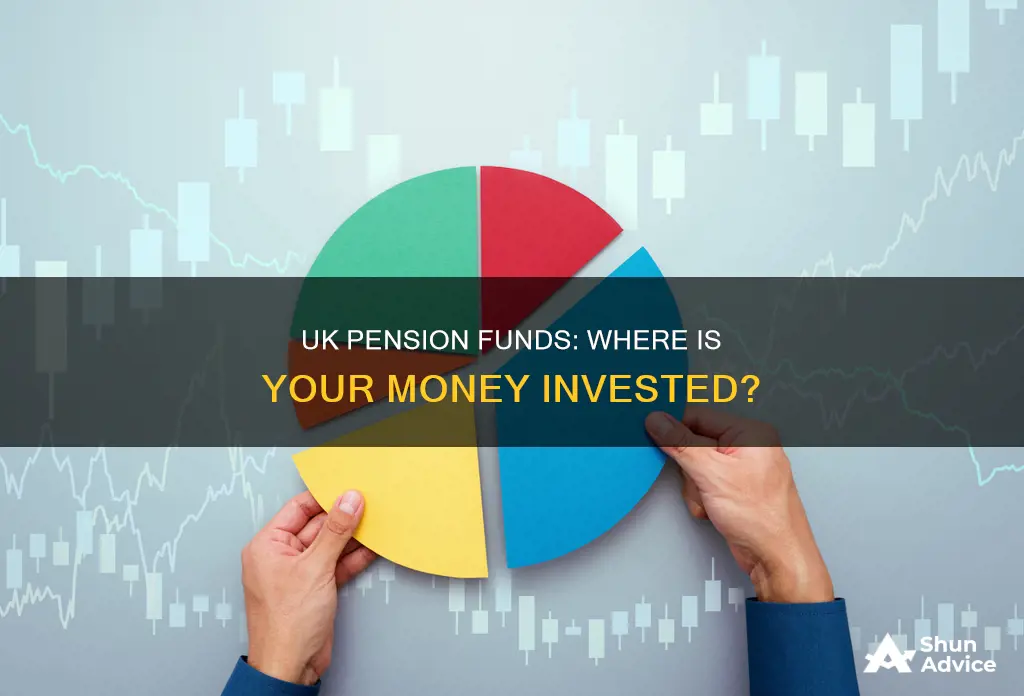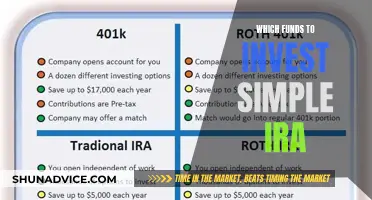
If you have a pension, you might be asked to decide how your money will be invested until your retirement. The aim of investing money in a pension is to help grow the money into a larger amount. Your pension fund is a way of pooling money with other investors. The fund invests your money in 'assets' that are professionally managed by a fund manager. The four main asset classes are money market investments, loans to companies or the UK government, commercial property, and stakes in companies (equities). You can choose from a wide range of fund types to suit your investment style and attitude to risk.
Where do UK pension funds invest?
| Characteristics | Values |
|---|---|
| Investment types | Company shares, property, bonds, cash, fixed interest securities, equities, commodities, currencies, gilts, corporate bonds, dividend-paying UK companies, global equities, commercial property, stakes in companies |
| Investor type | Cautious, adventurous, in-between/balanced/medium-risk |
| Fund type | Lifestyle or target date fund, default fund, ethical or socially responsible fund, Sharia-compliant fund |
| Other | Risk level, time period of investment, investment returns, fund charges, investment growth, inflation, volatility, diversification |
What You'll Learn
- Pension funds can be invested in company shares, property, bonds, or a mixture of different types of investments
- Pension funds can be invested in stocks and shares ISAs
- Pension funds can be invested in gilts (government bonds)
- Pension funds can be invested in the UK property market
- Pension funds can be invested in exotic assets such as farmland, vintage cars, wine, fledgling technology firms, or art

Pension funds can be invested in company shares, property, bonds, or a mixture of different types of investments
Company shares, also known as equities, are a way to own a stake in a company. The value of these shares depends on how well the company performs. They are considered a higher-risk investment, as their value can fluctuate significantly, but they have historically performed better than cash or bonds over the long term.
Property investment typically involves investing in commercial real estate to generate rental income and capital growth.
Bonds are a type of investment where the investor loans money to a company or government in exchange for a set rate of interest until a specified date. They are considered lower-risk than company shares but may offer lower returns over the long term.
Diversification is a common strategy where pension funds are invested in a mix of different types of assets to reduce risk. This could include a combination of company shares, property, bonds, and other investments such as cash, commodities, currencies, or funds.
The choice of investment strategy depends on various factors, including an individual's risk tolerance, investment horizon, and financial goals. It is recommended to review investment choices regularly and seek financial advice when needed.
Strategic Timing for Long-Term Bond Fund Investments
You may want to see also

Pension funds can be invested in stocks and shares ISAs
With a stocks and shares ISA, you can choose to invest in a wide range of investments, including individual stocks and shares, funds, investment trusts, and exchange-traded funds (ETFs). This gives you flexibility in how you invest your pension and allows you to tailor your investments to your risk tolerance and financial goals.
When investing your pension in a stocks and shares ISA, it's important to consider your investment horizon, which is the number of years until you plan to retire and start accessing your pension. Generally, younger investors can afford to take on more risk and invest a larger portion of their pension in stocks, as they have more time to ride out any short-term market volatility. As you get closer to retirement, it's generally advisable to shift your investments towards more stable assets, such as bonds and cash, to preserve your capital.
It's also important to consider diversification when investing your pension in a stocks and shares ISA. Diversification means spreading your investments across different asset classes, sectors, and geographic regions to reduce risk. By diversifying your investments, you can lower the impact of market downturns or underperforming investments on your overall portfolio.
Additionally, when investing your pension in a stocks and shares ISA, it's crucial to regularly review and rebalance your portfolio. This involves monitoring the performance of your investments and making adjustments to ensure they remain aligned with your financial goals and risk tolerance.
Overall, investing your pension in a stocks and shares ISA can be a great way to grow your retirement savings over time, but it's important to carefully consider your investment choices and seek professional advice if needed.
Bond Funds: Where to Invest Now?
You may want to see also

Pension funds can be invested in gilts (government bonds)
Defined benefit pension schemes, which pay pensioners a fixed annual amount, often invest more than half of their assets in bonds, including gilts, to be able to meet pension liabilities decades into the future. These schemes typically hedge their positions through gilt derivatives managed by liability-driven investment (LDI) funds. However, as seen in the UK in 2022, sharp swings in the gilt markets can cause problems for pension funds. When gilt prices plummeted after the UK government's "mini" budget announcement, pension funds were forced to sell gilts to meet collateral calls, causing prices to fall further.
Despite the potential risks, gilts remain a popular investment choice for pension funds due to their perceived safety and ability to provide long-term returns that outpace inflation. They are particularly attractive to defined benefit pension schemes, which need to make payments to pensioners for decades.
Overall, pension funds that invest in gilts aim to balance their portfolio by including a mix of lower-risk and higher-risk investments to achieve long-term growth while managing potential downturns in the market.
Index Funds: Choosing the Right Investment Strategy
You may want to see also

Pension funds can be invested in the UK property market
When investing pension funds in the UK property market, it's important to distinguish between residential and commercial property. Investing in residential property through a Self-Invested Personal Pension (SIPP) can result in losing the usual tax advantages associated with a SIPP, leading to a significant tax bill. Therefore, pension funds are more commonly invested in commercial properties such as offices, shops, restaurants, or industrial premises.
Another option for investing in UK property through pension funds is to use a Small Self-Administered Scheme (SSAS). This type of pension scheme offers similar benefits to a SIPP but with more flexibility and control over investment choices.
It's worth noting that investing in property through pension funds can provide tax efficiency and help diversify investment portfolios. However, there are complex criteria for qualifying pension funds, and careful consideration is needed to navigate VAT implications and investment options. Seeking expert financial advice is recommended to ensure compliance with regulations and maximise the potential benefits of property investment through pension funds.
Understanding Passive Index Funds and Their Investment Types
You may want to see also

Pension funds can be invested in exotic assets such as farmland, vintage cars, wine, fledgling technology firms, or art
Farmland
Farmland is a natural resource and an example of a private market asset. Private market assets are investments in the capital of privately owned structures. They are often long-term investments that can take years to realise for cash. Natural resources, such as agricultural land, can offer a hedge against inflation over the long term.
Vintage cars
Vintage cars are a physical, tangible asset that can be classified as an alternative investment. Alternative investments are those that fall outside the traditional asset classes of stocks, bonds, and cash. They can be a good way to diversify a portfolio and hedge against market volatility.
Wine
Wine, like vintage cars, is a tangible asset that can be classified as an alternative investment. Fine wines, in particular, can be a good store of value and offer stable returns.
Fledgling technology firms
Fledgling technology firms are a form of venture capital investment, which involves investing in start-up or emerging opportunities. These investments typically carry a higher risk but also offer the potential for high returns.
Art
Art is another example of an alternative investment that can provide diversification benefits to a portfolio. Art investments can also be a good hedge against inflation as they tend to have a low correlation with traditional financial assets.
It is important to note that investing in exotic assets may not be suitable for everyone, and it is crucial to carefully consider the risks and potential returns involved before making any investment decisions.
Equity Funds: When to Invest for Maximum Returns
You may want to see also







